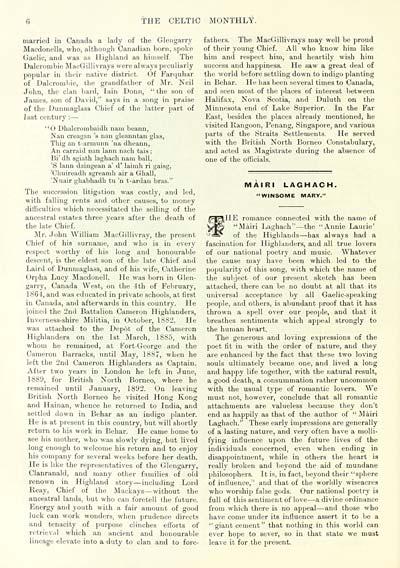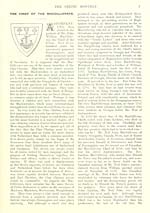Blair Collection > Celtic monthly > Volume 7, 1899
(20)
Download files
Complete book:
Individual page:
Thumbnail gallery: Grid view | List view

THE CELTIC MONTHLY.
married in Canada a lady of the Glengarry
Macdonells, who, although Canadian born, spoke
Gaelic, and was as Highland as himself. The
Dalcrombie MaoGillivrays were always peculiarly
popular in their native district. Of Farquhar
of Dalcrombie, the grandfather of Mr. Neil
John, the clan bard, Iain Donn, " the son of
James, son of David," says in a song in praise
of the Dunmaglass Chief of the latter part of
] ast century : —
"O Dhalcrombaidh nam beann,
Nan creagan 's nan gleanntan glas,
Thig an t-armunn 'na dheann,
An carraid nan lann nach tais ;
Bi' dh sgiath laghach nam ball,
'S lann daingean a' d' laimh ri gaisg,
'Chuireadh sgreamh air a Ghall,
'Nuair ghabhadh tu 'n t-ardan bra.s."
The succession litigation was costly, and led,
with falling rents and other causes, to money
difficulties which necessitated the selling of the
ancestral estates three years after the death of
the late Chief.
Mr. John William MacGillivray, the present
Chief of his surname, and who is in every
respect worthy of his long and honourable
descent, is the eldest son of the late Chief and
Laird of Dunmaglass, and of his wife, Catherine
Or])ha Lucy Macdoneli. He was born in Glen-
garry, Canada West, on the 4th of February,
1864, and was educated in private schools, at first
in Canada, and afterwards in this country. He
joined the 2nd Battalion Cameron Highlanders,
Inverness-shire Militia, in October, IS82. He
was attached to the Depot of the Cameron
Highlanders on the 1st March, 1885, with
whom he remained, at Fort-George and the
Cameron Barracks, until May, 1887, when he
left the 2nd Cameron Highlanders as Captain.
After two years in London he left in June,
1889, for British North Borneo, where he
remained until January, 1892. On leaving
British North Borneo he visited Hong Kong
and Hainan, whence he returned to India, and
settled down in Behar as an indigo i)lanter.
He is at present in this country, but will shortly
return to his work in Behar. He came home to
see his mother, who was slowly dying, but lived
long enough to welcome his return and to enjoy
his company for several weeks before her death.
He is like the representatives of the Glengarry,
Clanranald, and many other families of old
renown in Highland story — including Lord
Reay, Chief of the Mackays^without the
ancestral lands, but who can foretell the future.
Energy and youth with a fair amount of good
luck can work wonder-s, wlien prudence directs
and tenacity of purpose clinches efforts of
retrieval which an ancient and honourable
lineage elevate into a duty to clan and to fore-
fathers. The MacGillivrays may well be proud
of their young Chief. All who know him like
him and respect him, and heartily wish him
success and happiness. He saw a great deal of
the world before settling down to indigo planting
in Behar. He has been several times to Canada,
and seen most of the jilaces of interest between
Halifax, Nova Scotia, and Duluth on the
Minnesota end of Lake Superior. In the Far
East, besides the places already mentioned, he
visited Rangoon, Penang, Singapore, and various
parts of the Straits Settlements. He served
with the British North Borneo Constabulary,
and acted as Magistrate during the absence of
one of the officials.
MAIRI LAGHACH.
"WINSOME MARY."
|p|R||HE romance connected with the name of
O^ "Miiri Laghach" — the "Annie Laurie'
^^? of the Highlands — has always had a
fascination for Highlanders, and all true lovers
of our national poetry and music. Whatever
the cause may have been which led to the
popularity of this song, with which the name of
the subject of our present sketch has been
attached, there can be no doubt at all that its
universal acceptance by all Gaelic-speaking
people, and others, is abundant proof that it has
thrown a spell over our people, and that it
breathes sentiments which appeal strongly to
the human heart.
The generous and loving expressions of the
poet tit in with the order of nature, and they
are enhanced by the fact that these two loving
souls ultimately became one, and lived a long
and happy life together, with the natural result,
a good death, a consummation rather uncommon
with the usual type of romantic lovers. We
must not, however, conclude that all romantic
attachments are valueless because they don't
end as happily as that of the author of " M^iri
Laghach." These early impressions are generally
of a lasting nature, and very often have a molli-
fying influence upon the future lives of the
individuals concerned, even when ending in
disappointment, while in others the heart is
reall}' broken and beyond the aid of mundane
philosophers. It is, in fact, beyond their "sphere
of influence," and that of the worldly wiseacres
who worship false gods. Our national poetry is
full of this sentiment of love — a divine ordinance
from which there is no appeal — and those who
have come under its influence assert it to be a
"giant cement" that nothing in this world can
ever hope to sever, so in that state we must
leave it for the present.
married in Canada a lady of the Glengarry
Macdonells, who, although Canadian born, spoke
Gaelic, and was as Highland as himself. The
Dalcrombie MaoGillivrays were always peculiarly
popular in their native district. Of Farquhar
of Dalcrombie, the grandfather of Mr. Neil
John, the clan bard, Iain Donn, " the son of
James, son of David," says in a song in praise
of the Dunmaglass Chief of the latter part of
] ast century : —
"O Dhalcrombaidh nam beann,
Nan creagan 's nan gleanntan glas,
Thig an t-armunn 'na dheann,
An carraid nan lann nach tais ;
Bi' dh sgiath laghach nam ball,
'S lann daingean a' d' laimh ri gaisg,
'Chuireadh sgreamh air a Ghall,
'Nuair ghabhadh tu 'n t-ardan bra.s."
The succession litigation was costly, and led,
with falling rents and other causes, to money
difficulties which necessitated the selling of the
ancestral estates three years after the death of
the late Chief.
Mr. John William MacGillivray, the present
Chief of his surname, and who is in every
respect worthy of his long and honourable
descent, is the eldest son of the late Chief and
Laird of Dunmaglass, and of his wife, Catherine
Or])ha Lucy Macdoneli. He was born in Glen-
garry, Canada West, on the 4th of February,
1864, and was educated in private schools, at first
in Canada, and afterwards in this country. He
joined the 2nd Battalion Cameron Highlanders,
Inverness-shire Militia, in October, IS82. He
was attached to the Depot of the Cameron
Highlanders on the 1st March, 1885, with
whom he remained, at Fort-George and the
Cameron Barracks, until May, 1887, when he
left the 2nd Cameron Highlanders as Captain.
After two years in London he left in June,
1889, for British North Borneo, where he
remained until January, 1892. On leaving
British North Borneo he visited Hong Kong
and Hainan, whence he returned to India, and
settled down in Behar as an indigo i)lanter.
He is at present in this country, but will shortly
return to his work in Behar. He came home to
see his mother, who was slowly dying, but lived
long enough to welcome his return and to enjoy
his company for several weeks before her death.
He is like the representatives of the Glengarry,
Clanranald, and many other families of old
renown in Highland story — including Lord
Reay, Chief of the Mackays^without the
ancestral lands, but who can foretell the future.
Energy and youth with a fair amount of good
luck can work wonder-s, wlien prudence directs
and tenacity of purpose clinches efforts of
retrieval which an ancient and honourable
lineage elevate into a duty to clan and to fore-
fathers. The MacGillivrays may well be proud
of their young Chief. All who know him like
him and respect him, and heartily wish him
success and happiness. He saw a great deal of
the world before settling down to indigo planting
in Behar. He has been several times to Canada,
and seen most of the jilaces of interest between
Halifax, Nova Scotia, and Duluth on the
Minnesota end of Lake Superior. In the Far
East, besides the places already mentioned, he
visited Rangoon, Penang, Singapore, and various
parts of the Straits Settlements. He served
with the British North Borneo Constabulary,
and acted as Magistrate during the absence of
one of the officials.
MAIRI LAGHACH.
"WINSOME MARY."
|p|R||HE romance connected with the name of
O^ "Miiri Laghach" — the "Annie Laurie'
^^? of the Highlands — has always had a
fascination for Highlanders, and all true lovers
of our national poetry and music. Whatever
the cause may have been which led to the
popularity of this song, with which the name of
the subject of our present sketch has been
attached, there can be no doubt at all that its
universal acceptance by all Gaelic-speaking
people, and others, is abundant proof that it has
thrown a spell over our people, and that it
breathes sentiments which appeal strongly to
the human heart.
The generous and loving expressions of the
poet tit in with the order of nature, and they
are enhanced by the fact that these two loving
souls ultimately became one, and lived a long
and happy life together, with the natural result,
a good death, a consummation rather uncommon
with the usual type of romantic lovers. We
must not, however, conclude that all romantic
attachments are valueless because they don't
end as happily as that of the author of " M^iri
Laghach." These early impressions are generally
of a lasting nature, and very often have a molli-
fying influence upon the future lives of the
individuals concerned, even when ending in
disappointment, while in others the heart is
reall}' broken and beyond the aid of mundane
philosophers. It is, in fact, beyond their "sphere
of influence," and that of the worldly wiseacres
who worship false gods. Our national poetry is
full of this sentiment of love — a divine ordinance
from which there is no appeal — and those who
have come under its influence assert it to be a
"giant cement" that nothing in this world can
ever hope to sever, so in that state we must
leave it for the present.
Set display mode to: Large image | Transcription
Images and transcriptions on this page, including medium image downloads, may be used under the Creative Commons Attribution 4.0 International Licence unless otherwise stated. ![]()
| Early Gaelic Book Collections > Blair Collection > Celtic monthly > Volume 7, 1899 > (20) |
|---|
| Permanent URL | https://digital.nls.uk/75858814 |
|---|
| Shelfmark | Blair.59 |
|---|---|
| Additional NLS resources: | |
| Attribution and copyright: |
|
| Description | A selection of books from a collection of more than 500 titles, mostly on religious and literary topics. Also includes some material dealing with other Celtic languages and societies. Collection created towards the end of the 19th century by Lady Evelyn Stewart Murray. |
|---|
| Description | Selected items from five 'Special and Named Printed Collections'. Includes books in Gaelic and other Celtic languages, works about the Gaels, their languages, literature, culture and history. |
|---|

